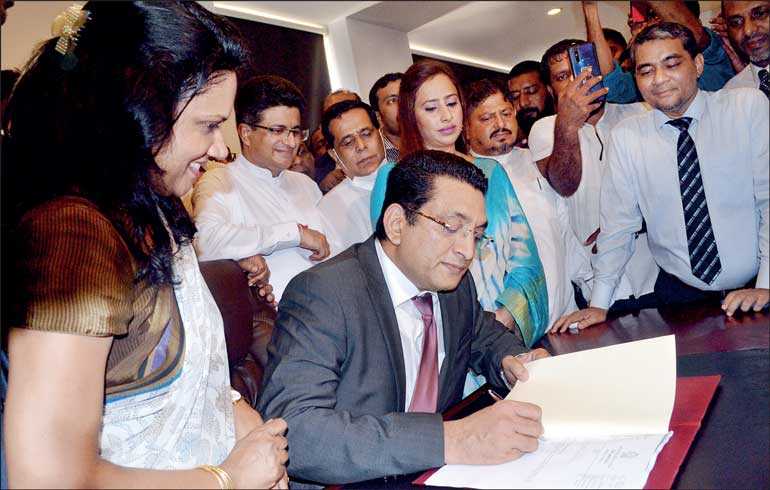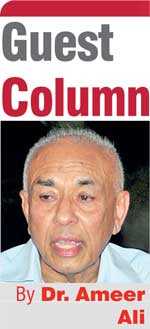Tuesday Feb 17, 2026
Tuesday Feb 17, 2026
Wednesday, 19 August 2020 00:00 - - {{hitsCtrl.values.hits}}

Being the only Muslim minister in the Cabinet it will be interesting to watch his performance against all odds – Pic by Shehan Gunasekara
The appointment of Ali Sabry (AS), as the only Muslim minister in a 28-member cabinet, by President Gotabaya Rajapaksa (GR), amidst stiff opposition from hardline Sinhala-Buddhist nationalists, who obviously wanted a Muslim-free cabinet, has provoked some controversy about the appointee’s future role in the government, service to his community and contribution to the country.
Already, a few have drawn a comparison between AS’s appointment as Justice Minister and Chandrika Bandaranaike Kumaratunga’s (CBK) appointment of Lakshman Kadirgamar (LK) as Foreign Minister, and they conclude that both were appointments intended primarily to implement certain hard and controversial decisions by their governments that would hurt the interests of the respective ministers’ communities, Muslims and Tamils, more than anything else.
In terms of the intellectual and professional calibre of the two ministers none can find any shortcoming. However, LK’s crusade against the LTTE made him, in the eyes of Tamil nationalists, an enemy of the Tamil community. Similarly, GR and his cabinet are under pressure from Buddhist supremacists to enforce the principle of One-Country-One-Law, which would mean not only the abolition of Muslim personal laws, such as the controversial Muslim Marriage and Divorce Act, but also a review of the rationale for the existence of Muslim madrasas and even Muslim public schools. Will AS be the man to carry out some of these radical measures? Will he get the support from his own community to push through such changes? Only time will tell.
Apart from AS and LK there was another minister, Badiuddin Mahmud (BM), appointed as Minster of Education between 1960-1963 and 1970-77 and as Minster of Health between 1963-65, by Sirimavo Bandaranaike (SB). In a few media interviews and public speeches, AS has shown great admiration to BM. It appears that BM was a good friend of AS’ father. Therefore, it is worth reminding him of how BM achieved what he did and the circumstances in which he operated. Just as Sabry was appointed amidst bitter opposition from hardline Sinhala-Buddhist nationalists, so also was BM, who faced a similar environment at later stages in his career, arising from both within and outside the cabinet. And, just as GR appears to be solidly behind AS so was SB behind BM.
However, 1970s were fundamentally different from 2020 and after. True, there were elements from both Sinhala and Tamil nationalism conveniently joining hands with elements from Muslim conservatism to attack BM and the backing he received from SB, but the nationalists at that time especially from Buddhist quarters were not as vicious, parochial and bitterly anti-Muslim as their current avatars. It is this aggressive transmutation of the character of Buddhist nationalism that will make AS’ ministerial position more challenging and his ability to serve his community highly circumscribed.
As far as BM was concerned, he was essentially a patriot and a visionary. He was able to serve his own community at multiple levels without sacrificing his own stature as an uncompromising patriot and an unrelenting supporter of progressive and modernity. His was an illustrious career as a minister and community leader, which cannot be condensed and explained in a few sentences or paragraphs. Yet, one or two milestones from his 12-year ministerial history would reveal how tactfully he achieved what he wanted.
As the Minister of Education, he was singularly responsible for the nationalisation of private schools and as the Minister of Health he fearlessly implemented measures to abolish private practice by medical doctors. Of course, these were reversed later under the UNP government. However, in implementing those and other controversial measures, particularly in education, BM did not have the full support of his own community. The court battle over the takeover of Colombo Zahira College illustrates his community’s opposition.
There was another issue, the introduction of music and dancing as part of Muslim school curriculum, which earned him the wrath of all conservative Muslim elements. Even one of the then budding Muslim leaders at that time, who later created a Muslim political party, joined hands with the mullahs to condemn the minister. Similarly, the Tamil community never supported BM and when he introduced the standardisation scheme for university entry he became the inveterate enemy of the Tamil community especially from the north.
Above all, as a Muslim visionary BM wanted to change the public image of his people as a ‘business community’. He wanted to lead his people on a different direction and in line with changes taking place at the national level. It was with that aim he once invited all prominent Muslim leaders in 1972 for an afternoon tea at his residence in Colombo and warned them against joining the reactionaries and opposing his government’s economic reforms. He encouraged the leaders to look out for other avenues for economic survival.
On his part, he chose education as one avenue and through that wanted to create a Muslim community with a class of scholars, scientists and professionals. Today’s Muslim Maha Vidyalayas and the nucleus of a Muslim intelligentsia are silent testimonies for BM’s vision. In doing all this he carried the full confidence of his party leader, SB.
BM’s main worry was not about the opposition from the majority community, which with the support of his Prime Minister he was able to overcome, but from his own community. It was to counter that opposition he created the Islamic Socialist Front (ISF) behind which rallied Muslim teachers, students, professionals and Muslim youth in general. It was the rising popularity of ISF that provoked the UNP, under one of its stalwarts M.H. Mohamed, to create the Anti-Marxist Front behind which all religious conservatives flocked. Is Ali Sabry’s National Muslim Collective Forum a new version of ISF? Let history judge.
To cut this discussion short, GR’s AS is energetic, intelligent, professional and like SB’s BM, he wants to pull the Muslim community along a new direction without undermining GR’s own vision of a ‘disciplined and virtuous’ society. Yet, the challenges facing him are formidable. Sinhala-Buddhist ethno-nationalism and Islamic conservatism are just two of them and they are diametrically opposed. There is also in addition the issue of reconciliation with the Tamil community. GR believes that economic development in the north and east is the only way to reconcile. This will be problematic because it is like putting the cart before the horse. Can AS be a bridge builder between GR and the Tamil community? Being the only Muslim minister in the cabinet it will be interesting to watch his performance against all odds and see whether he could match SB’s BM. At the end of all what BM did to advance the status of his community, that community rejected him when he decided to contest the election in 1977. So much for Muslims’ gratitude and AS should be well aware of this fact.
(The writer is attached to the School of Business and Governance, Murdoch University, Western Australia.)